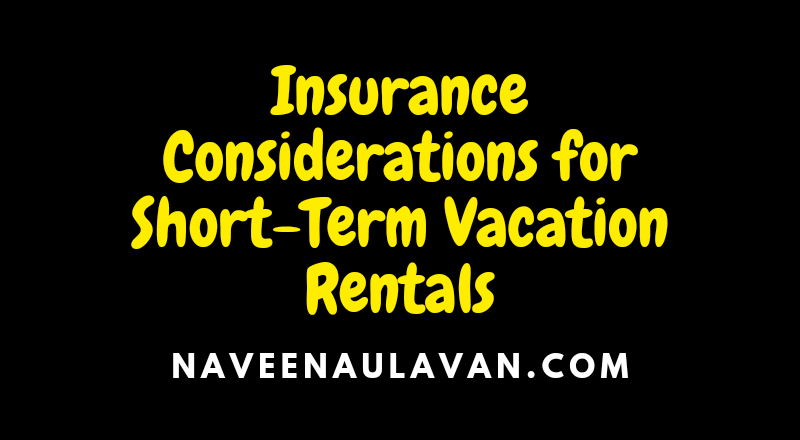The rise of platforms like Airbnb and HomeAway has made short-term vacation rentals increasingly popular. More and more homeowners are renting out their properties to travelers looking for a unique and personalized accommodation experience. However, as with any business venture, there are certain risks and responsibilities that come with renting out your home. One crucial aspect that should not be overlooked is insurance coverage. In this article, we will explore the insurance considerations that owners need to keep in mind when renting out their properties for short-term vacations.
Understanding Short-Term Rental Insurance
When it comes to insurance coverage for short-term vacation rentals, homeowners cannot rely solely on their traditional homeowners’ insurance policy. Most homeowners’ policies are designed to cover long-term, owner-occupied residences and may exclude or provide limited coverage for short-term rentals. Therefore, it is crucial for homeowners to seek additional insurance coverage specifically tailored for short-term rental activities.
1. Different Types of Insurance Policies
There are several types of insurance policies available for short-term vacation rentals. Understanding the differences between them is essential to ensure you have the appropriate coverage.
a. Vacation Rental Insurance
Vacation rental insurance is a type of policy that is specifically designed to cover short-term rental properties. It provides coverage against risks such as property damage, liability claims, and even loss of rental income. This type of insurance takes into account the unique risks associated with short-term rentals and provides comprehensive coverage tailored to those needs.
b. Landlord Insurance
Landlord insurance is another option for homeowners renting out their properties for short-term vacations. This type of policy is typically used by landlords who rent out their properties on a long-term basis. While it may provide some coverage for short-term rentals, it is important to review the policy in detail to ensure it adequately covers all risks associated with your specific short-term rental activities.
c. Commercial Insurance
For homeowners who have multiple properties or engage in short-term rental activities as a business, commercial insurance is an option to consider. Commercial insurance policies offer more extensive coverage options and higher liability limits compared to vacation rental or landlord insurance. However, they are typically more expensive and may involve more complex underwriting processes.
2. Policy Considerations
When selecting the appropriate insurance policy for your short-term vacation rental, there are several key considerations to keep in mind.
a. Coverage for Property Damage
One of the primary risks associated with renting out your property is potential damage caused by guests. Ensure that your insurance policy covers damage to both the structure and contents of your home. It is a good idea to document the condition of your property before and after each rental to provide evidence in case you need to file a claim.
b. Liability Coverage
Liability coverage is crucial in protecting you against claims made by guests or third parties who may incur injuries or property damage during their stay. Make sure your insurance policy includes liability coverage, and review the policy limits to ensure they are sufficient for your needs. Consider purchasing an umbrella liability policy for additional protection, especially if you have multiple properties or engage in short-term rental activities as a business.
c. Loss of Rental Income
If your property becomes uninhabitable due to covered damage, it is essential to have coverage for loss of rental income. This coverage can help compensate you for the income you would have earned from your short-term vacation rental during the repair or restoration period.
d. Communicate with Your Insurance Company
It is essential to notify your insurance company or agent about your short-term rental activities. Failure to disclose this information may result in denied claims or even cancellation of your policy. By informing your insurance company, you can ensure that you are properly covered and that there are no policy exclusions that may invalidate your coverage.
3. Additional Considerations
Aside from selecting the right insurance policy, there are other important insurance considerations for short-term vacation rentals.
a. Guest Insurance
Encourage your guests to obtain travel insurance or renters insurance to protect themselves in case of unforeseen events. While this does not relieve you of your responsibility as a host, it can provide an additional layer of protection for both parties.
b. Safety and Security Measures
Taking appropriate safety and security measures can help mitigate risks and potentially reduce insurance premiums. Install smoke detectors, fire extinguishers, and security systems, and inform guests about emergency procedures and local safety guidelines.
c. Legal and Regulatory Compliance
Ensure that you comply with all local laws, zoning regulations, and permit requirements for short-term rentals. Non-compliance can affect your insurance coverage and may lead to
